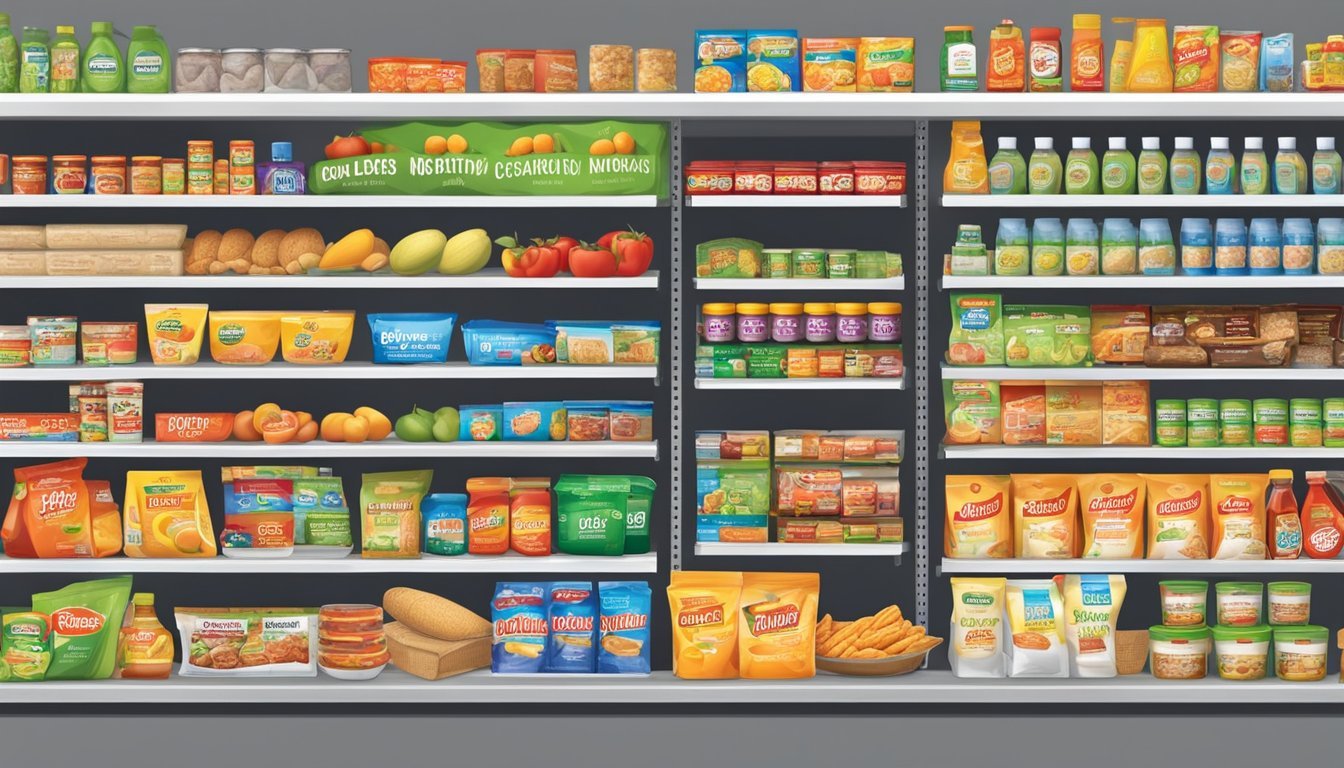Family Dollar vs FoodMaxx
Comparing Budget-Friendly Options for Shoppers
When it comes to grocery shopping on a budget, Family Dollar and FoodMaxx are two popular options that offer competitive prices. These stores cater to cost-conscious consumers looking to stretch their dollars further on everyday essentials and food items.
Family Dollar is a variety store chain that stocks a range of groceries alongside household goods. FoodMaxx, on the other hand, is a discount supermarket focused primarily on food products. While both stores aim to provide low prices, FoodMaxx typically offers a wider selection of fresh produce and grocery items at slightly lower costs than Family Dollar.
Comparing these two retailers involves examining factors such as price, product variety, and store experience. Budget-savvy shoppers may find that each store has its own strengths, making a combination of both useful for maximizing savings on different types of products.
Overview of Family Dollar and FoodMaxx
Family Dollar and FoodMaxx are two distinct grocery chains catering to budget-conscious shoppers. Family Dollar operates as a discount store, offering a variety of household goods and groceries at competitive prices.
FoodMaxx, on the other hand, positions itself as a warehouse-style supermarket focused primarily on groceries. Both stores have cultivated loyal followings in their respective markets.
Family Dollar typically has a smaller footprint and can be found in urban and rural areas across the United States. Its product range includes both name-brand and private-label items.
FoodMaxx stores are generally larger and concentrated in specific metro areas, particularly in California. They emphasize bulk purchases and no-frills shopping experiences to keep prices low.
While Family Dollar carries a mix of food and non-food items, FoodMaxx specializes in fresh produce, meats, and pantry staples. Both chains aim to provide affordable options for consumers looking to stretch their grocery budgets.
Family Dollar's parent company, Dollar Tree, has reported growth in same-store sales, indicating strong performance in the dollar store segment. FoodMaxx, as part of the Save Mart Companies, competes directly with traditional supermarkets and other discount grocers.
Price Comparison and Affordability
Family Dollar and FoodMaxx both aim to provide affordable grocery options, but their pricing strategies and overall value differ. Let's examine how these stores compare in terms of everyday prices, savings programs, and bulk purchase benefits.
Analysis of Everyday Prices
FoodMaxx generally offers lower prices on most everyday grocery items compared to Family Dollar. A typical shopping trip for basic groceries at FoodMaxx can save customers around 3% compared to other discount stores.
Family Dollar focuses on convenience and smaller package sizes, which can result in slightly higher per-unit costs. However, their prices remain competitive for many household staples and non-perishable goods.
Both stores use "loss leaders" - deeply discounted items to attract customers. FoodMaxx tends to have more aggressive pricing on fresh produce and meat, while Family Dollar often has better deals on packaged snacks and cleaning supplies.
Discount and Savings Programs
FoodMaxx offers a digital coupon program that allows customers to save additional money on select items each week. They also have periodic sales events that can lead to significant savings on seasonal products.
Family Dollar provides a "Smart Coupons" app where shoppers can clip digital coupons and receive personalized offers. They frequently run "$1 deals" on various items throughout the store.
Both stores accept manufacturer coupons, but FoodMaxx is known for having more lenient coupon policies, potentially leading to greater savings for savvy shoppers.
Comparing Bulk Purchase Advantages
FoodMaxx, being a larger format store, offers more opportunities for bulk purchases. They often have multi-pack deals and larger package sizes that can result in lower per-unit costs for customers willing to buy in quantity.
Family Dollar's smaller store format limits their bulk offerings. However, they do provide some multi-buy deals, especially on non-perishable items and household goods.
For families looking to save on a $250 weekly grocery budget, FoodMaxx's bulk options and lower overall prices may provide more substantial savings in the long run. Family Dollar can be more economical for smaller households or those making frequent, smaller purchases.
Product Variety and Availability
Family Dollar and FoodMaxx offer different product selections to cater to their target customers. Both stores aim to provide affordable options, but their inventory focus varies.
Groceries and Fresh Produce Selection
FoodMaxx typically carries a wider range of groceries and fresh produce compared to Family Dollar. Their produce section often includes a variety of fruits and vegetables, both conventional and organic. FoodMaxx usually stocks seasonal items and may offer local produce when available.
Family Dollar's grocery selection is more limited, focusing on shelf-stable items and a smaller fresh produce section. They carry basic fruits and vegetables but may not have the same variety as FoodMaxx. Family Dollar emphasizes packaged foods, snacks, and frozen items.
Both stores offer cereal, pasta, and canned goods, but FoodMaxx generally provides more brand options and larger package sizes.
Availability of Meat and Dairy Products
FoodMaxx typically has a more extensive meat and dairy section than Family Dollar. They often feature a full-service deli counter with various meats and cheeses. FoodMaxx usually stocks a range of fresh meats, including beef, pork, chicken, and sometimes fish.
Family Dollar's meat selection is primarily limited to frozen and processed options. Their dairy section is smaller, focusing on basic items like milk, eggs, and cheese.
Both stores carry yogurt and butter, but FoodMaxx generally offers more brands and product types. FoodMaxx may also have specialty dairy items that Family Dollar doesn't stock.
Non-Food Items and Household Supplies
Family Dollar excels in non-food items and household supplies. They offer a broader selection of cleaning products, paper goods, and personal care items compared to FoodMaxx. Family Dollar typically stocks:
Toilet paper and paper towels
Laundry detergent and fabric softeners
Dish soap and all-purpose cleaners
Shampoo, soap, and toiletries
Basic office supplies
FoodMaxx carries household essentials but may have a smaller selection than Family Dollar. They focus more on kitchen supplies and food storage containers. Both stores offer generic staples and store brand options for common household items, helping customers save money on everyday necessities.
Store Experience and Convenience
Family Dollar and FoodMaxx offer distinct shopping experiences. Each store has its own approach to layout, checkout processes, and delivery options that can impact customer satisfaction and convenience.
Layout and Navigability of Stores
Family Dollar typically features a compact layout with narrow aisles. Products are often displayed in mixed categories, which can make finding specific items challenging. Signage is minimal, requiring customers to explore shelves thoroughly.
FoodMaxx, in contrast, employs a more spacious layout reminiscent of traditional supermarkets. Wider aisles and clearer department divisions make navigation easier. Product categories are more logically organized, with produce, meats, and dairy sections clearly delineated.
Both stores use endcap displays for promotions, but FoodMaxx tends to have more open floor space, reducing congestion during busy periods.
Checkout Efficiency and Waiting Times
Family Dollar often operates with fewer checkout lanes, which can lead to longer wait times during peak hours. Self-checkout options are limited or nonexistent in many locations.
FoodMaxx typically offers more checkout lanes and frequently includes self-checkout kiosks. This setup can significantly reduce waiting times, especially for customers with fewer items.
Both stores aim to keep lines moving, but FoodMaxx's larger staff and varied checkout options generally result in a smoother process. Family Dollar's smaller footprint can sometimes lead to congestion near the registers.
Grocery Delivery Options and Accessibility
FoodMaxx has embraced online ordering and delivery services in many locations. Customers can shop via website or app, choosing between home delivery and curbside pickup options. This service enhances accessibility for those with mobility issues or busy schedules.
Family Dollar has been slower to adopt comprehensive delivery services. Some stores offer limited delivery through third-party apps, but it's not a standardized offering across all locations.
In terms of physical accessibility, both chains generally comply with ADA requirements. FoodMaxx stores, being larger, often provide more spacious aisles and easier navigation for customers using mobility aids.
Brand Reputation and Consumer Perception
Family Dollar and FoodMaxx have distinct brand images and customer perceptions. Their reputations are shaped by product quality, customer experiences, and overall value propositions.
Customer Loyalty and Retention
Family Dollar has built a loyal customer base by focusing on convenience and affordability. Their stores are often located in underserved areas, providing essential goods to communities with limited shopping options. This accessibility has fostered a sense of reliability among regular shoppers.
FoodMaxx, part of the Save Mart Companies, emphasizes bulk purchases and discounted prices. Their "no frills" approach attracts budget-conscious consumers looking to maximize savings. FoodMaxx's loyalty program offers additional incentives, encouraging repeat visits and larger purchases.
Both chains face challenges in retaining customers as competition increases. Family Dollar has worked to improve store conditions and expand product lines to keep shoppers engaged. FoodMaxx continues to refine its pricing strategies to maintain its appeal as a low-cost alternative.
Quality of Products and Brands Offered
Family Dollar stocks a mix of name-brand and private-label products. Their house brands aim to provide affordable alternatives to national brands. Quality perceptions vary, with some customers praising the value while others note inconsistencies.
FoodMaxx carries a wider range of grocery items, including fresh produce and meat. They offer both budget and premium options, allowing customers to choose based on their preferences and budget. FoodMaxx's produce quality is generally viewed positively, contributing to its reputation as a full-service grocery store.
Both retailers face scrutiny over product quality. Family Dollar has dealt with recalls and quality control issues in recent years. FoodMaxx works to maintain consistent quality across its diverse product range, particularly in perishable departments.
Ratings and Reviews by Customers and Experts
Customer reviews for Family Dollar often highlight convenience and low prices. Complaints typically focus on store cleanliness and product availability. Consumer Reports noted that dollar stores like Family Dollar are expanding rapidly but cautioned about limited fresh food options.
FoodMaxx receives praise for its competitive pricing on groceries. A comparison found FoodMaxx prices to be 21% lower than average, placing it among the most affordable options in some regions. Customer feedback often mentions savings on bulk items and fresh produce quality.
Expert analyses suggest FoodMaxx offers better overall value for grocery shopping. Family Dollar is recognized for its accessibility but faces criticism for limited healthy food choices. Both stores continue to adapt their strategies in response to customer feedback and market trends.
Comparative Advantages and Disadvantages
Family Dollar and FoodMaxx offer distinct shopping experiences with unique strengths and weaknesses. Each caters to different consumer needs and preferences.
The Case for Shopping at Family Dollar
Family Dollar provides a wide range of household items at competitive prices. It's ideal for quick purchases of everyday essentials. The store offers a mix of name-brand and private-label products, giving shoppers options at various price points.
Family Dollar stores are often located in residential areas, making them convenient for many customers. They stock a variety of non-grocery items like cleaning supplies, personal care products, and seasonal goods.
The chain frequently runs promotions and sales, allowing savvy shoppers to save even more. Family Dollar's smaller store format can make shopping trips quicker and less overwhelming compared to larger supermarkets.
The Case for Shopping at FoodMaxx
FoodMaxx specializes in groceries and offers a broader selection of food items than Family Dollar. It's known for its competitive pricing on fresh produce, meat, and dairy products.
The store's bulk buying options can lead to significant savings for larger families or those who prefer to stock up. FoodMaxx often carries a wider variety of international and specialty food items.
FoodMaxx stores typically have dedicated sections for bakery and deli items, providing more options for prepared foods. Their larger store format allows for a more comprehensive grocery shopping experience.
Head-to-Head Comparison for Specific Needs
For basic household items: Family Dollar often has the edge due to its focus on non-food essentials.
Fresh produce and meats: FoodMaxx generally offers better quality and selection.
Price comparison:
Pantry staples: FoodMaxx tends to be cheaper
Cleaning supplies: Family Dollar usually wins
Brand selection: FoodMaxx offers more variety in food brands, while Family Dollar has a good mix of household product brands.
Shopping experience: Family Dollar provides quicker trips, FoodMaxx allows for more extensive grocery shopping.
Location: Family Dollar has more urban and rural locations, FoodMaxx is typically found in suburban areas.
Conclusion and Recommendations
Family Dollar and FoodMaxx cater to different consumer needs. FoodMaxx offers a wider selection of groceries and fresh produce at competitive prices. It appeals to shoppers seeking a traditional supermarket experience with potential savings.
Family Dollar, as a true dollar store, provides convenience for quick purchases and household essentials. However, its grocery options are more limited.
For substantial grocery shopping, FoodMaxx is the better choice. It offers a broader range of healthy food options and typically beats Family Dollar on average prices for comparable items.
Consumers should be cautious of undersized items at dollar stores. Checking price per unit and using scales when available can help ensure the best value.
Those prioritizing savings may want to compare FoodMaxx prices with other budget-friendly options like WinCo or Grocery Outlet. These stores often have lower prices on certain market basket items.
Ultimately, the best choice depends on individual needs and shopping habits. FoodMaxx suits larger grocery runs, while Family Dollar works for quick, small purchases.







